Spirit of defiance at Burma's Monywa mine
- Published
.jpg)
The farmers said that they would never accept the Chinese-backed mine
As you drive west from Mandalay towards Monywa, the flat, dry farmland of central Burma is suddenly punctuated by a group of steep green hills.
These contain substantial reserves of copper that have been mined since 1998, first by a Canadian company, Ivanhoe, and for the past year by Wanbao Mining, a subsidiary of the Chinese arms manufacturer Norinco.
The former military government first opened up Burma's mining sector to foreign investment after the 1988 protests, which had been inflamed in the catastrophic mismanagement of the economy.
But the arrangement under which Ivanhoe divested its stake in the Monywa copper mine, to avoid Western sanctions against Burma, is still shrouded in mystery.
Secret deal
It began in 2007, before the democratic opening initiated last year by President Thein Sein, in the days when the Burmese authorities took little account of public opinion, at home or abroad.
The deal, under which farmers in 26 surrounding villagers were told to surrender around 3,000 hectares of land, might also have remained unknown, had the farmers not found the courage to speak out.
"They called us to a meeting and told us our land was needed to expand the mine," 38-year-old Yi Yi Win said.
"One of the farmers said he did not accept the deal - then they arrested him and they threatened us. We were all afraid, so we agreed to the deal, but they made us sign a contract we did not understand."
She was speaking to me inside a small pagoda on the edge of the mine, the last building left of a monastery complex which has already been demolished.
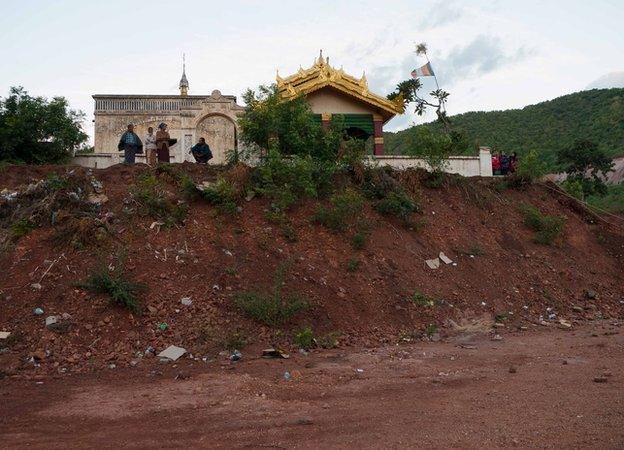
This pagoda on the edge of the copper mine is all that remains of a Buddhist monastery, demolished when the mine expanded it operations. Until the police operation it was occupied by farmers.
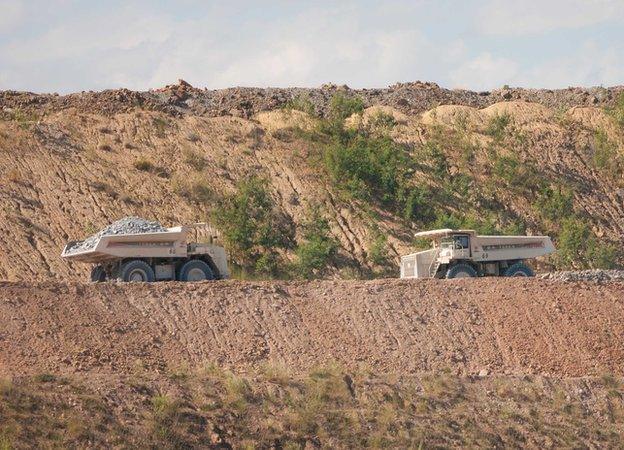
Huge trucks carry copper ore along a hillside next to an older part of the Monywa mine project.
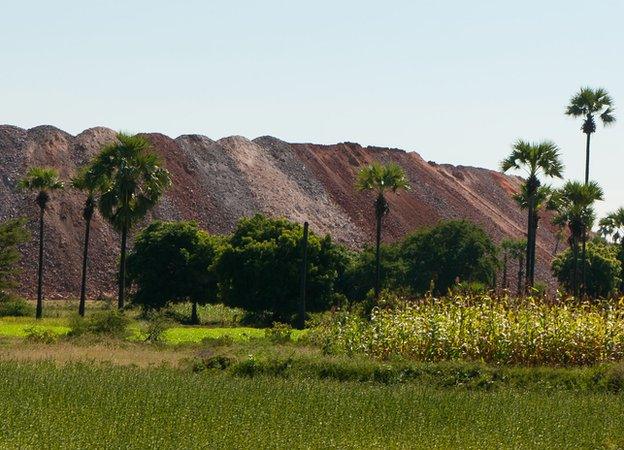
Copper tailings - the waste left after copper ore has been extracted - tower over the landscape around Salingyi township.
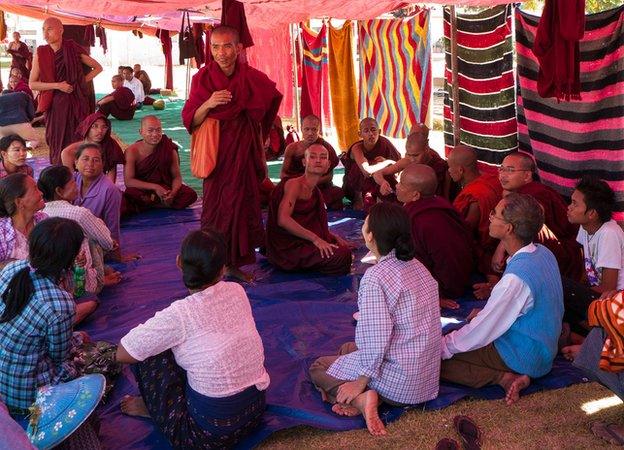
Monks from across the country have been coming to show their support for local farmers.
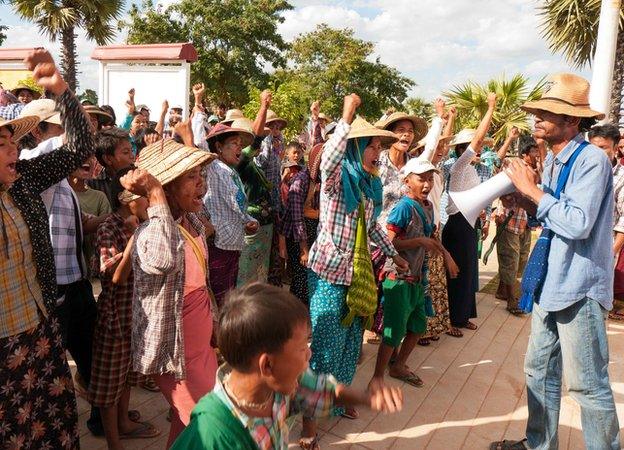
Farmers protesting outside the main entrance to the Wangbao mine camp.
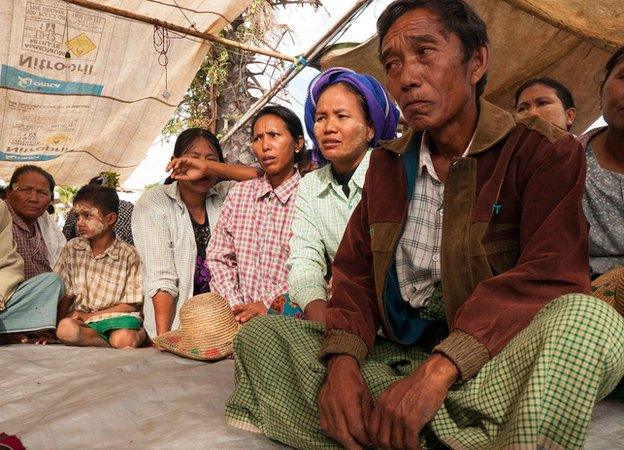
Aye New, 2nd from right, said she would never accept the mine. She was particularly distressed by the destruction of the monastery.
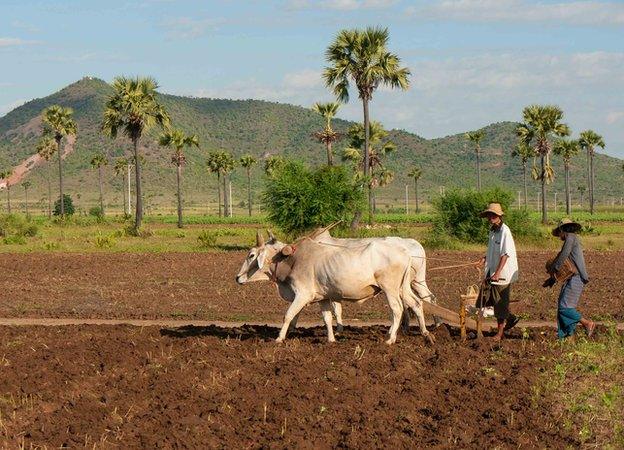
These fields and the hill behind are destined to be swallowed up by the mine as it expands.
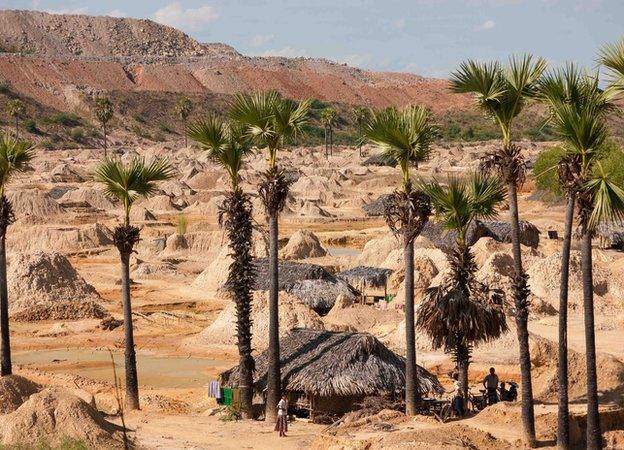
People live amid the waste tailings left by the mine, trying to extract copper using methods that cause serious pollution.
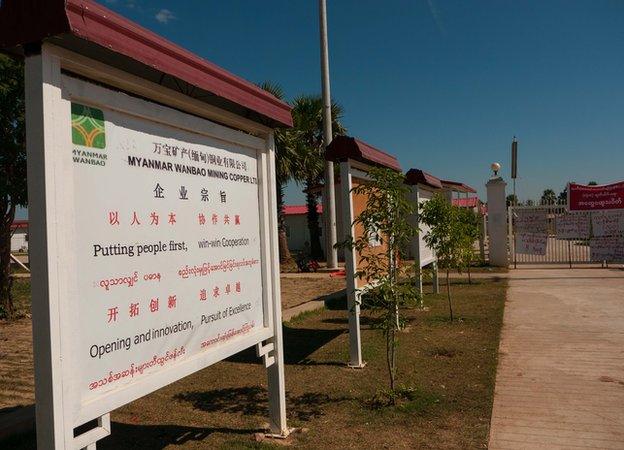
Wangbao, whose parent company is the Chinese arms manufacturer Norinco, says its dealings with the farmers have been fair, and that only a minority have rejected the deal to give up land.
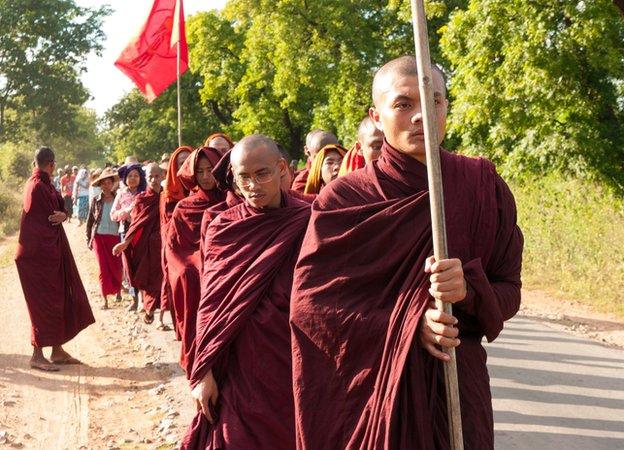
Monks lead a protest march by farmers near the Monywa mine site.
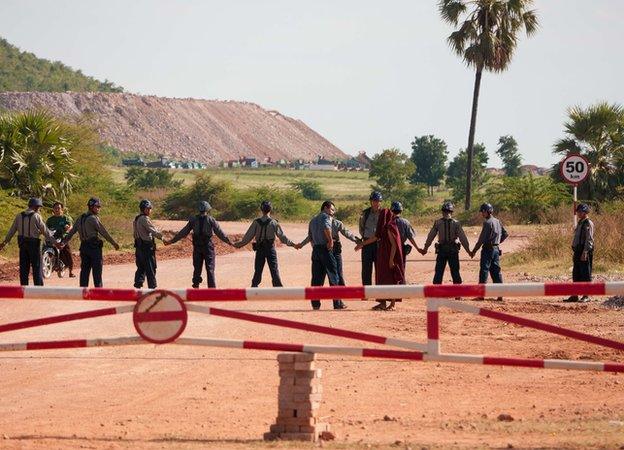
Police join hands as a Buddhist monk walks away after trying to negotiate access
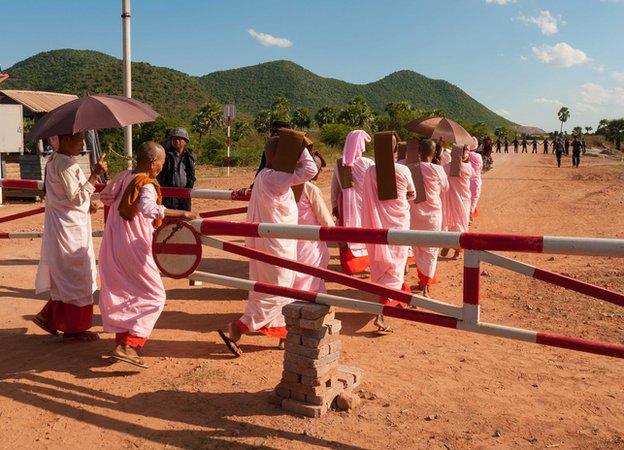
A group of nuns is allowed inside the mine site.
All around the pagoda, the land has been excavated by mining machines, a huge, red bowl cut out of the hill. Yi Yi Win had been there six days, along with dozens of other farmers, determined not just to save the pagoda, but to force the mine, Burma's biggest, to shut down.
We were inside the mine perimeter, and they showed me red signs, warning people that it had been declared a restricted zone under Article 144 of the criminal code.
So we had been brought there in the early hours of the morning, through cornfields on motorbikes, before the security guards woke up. Getting out involved a rather unconvincing disguise under a conical farmer's hat and a mad dash for the bikes.
That sit-in has now been broken up by the police, along with five other protest camps, in an operation more in keeping with the old Burma than the new.
No compromise
Between 20 and 30 protestors, many of them Buddhist monks, were injured, some with severe burns after the camps were set alight.
But the spirit of defiance I witnessed there will not be easily crushed.
We arrived at another of the camps - no more than a few old sacks and tarpaulins spread out along the road opposite the mine entrance - and were immediately surrounded by farmers, who until a year ago, they said, would never have dared to speak to a foreigner about their problems.
Now everyone wanted to speak, although their message was more or less the same: the mine has to be shut down. No compromise was possible, they said.
The demolition of the monastery has caused particular anger - temples and other religious buildings are considered the spiritual core of the community. But there was just as much anger over the destruction of the hills, an inevitable consequence of copper mining.
The farmers, who have little experience of political mobilisation, have certainly been encouraged by the involvement of political activists from other parts of the country, who are also taking advantage of the recent opening in Burma, and from the support of Buddhist monks.
The Monywa mine has now become a national cause, encompassing issues that will be central to Burma's post-military development - land rights, environmental protection, freedom to protest, and balancing the interests of big investors with those of ordinary Burmese citizens.
Of these, land may turn out to be the most explosive issue, and the hardest for the new government to solve.
Explosive issue
When Ne Win seized power in 1962, starting what was to become nearly 50 years of unbroken military rule, he announced the "Burmese Way to Socialism", an inward-looking philosophy that cut the country off from foreign influence and nationalised all land and industry.
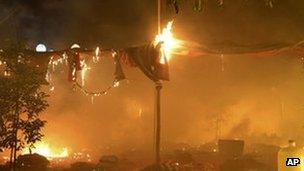
Protesters said dozens were injured and their camps set alight in Monywa town
This left the state as the sole landowner. Today very few Burmese have any documents giving them official ownership of land their families may have farmed and lived on for many generations.
But as the military opened up the economy to outside investment in the 1990s, it started selling tracts of land to big, usually well-connected companies.
The end of sanctions this year has led to a huge surge in investor interest in Burma, and with that, a rise in land-confiscations.
Companies that may have acquired land years ago but left the farmers to use it, now want to secure it for possible development. New laws passed earlier this year by parliament have made this easier to do.
The result has been a backlash of protests across the country, by people who thought the new era would bring them greater prosperity, but now find it may rob them of their land.
Some of these protests have been against well-established industrial estates in Rangoon, where most of the factories that will be the main source of new jobs are likely to be built once foreign investment arrives.
Peaceful navigation
Learning how to manage protests peacefully will be another challenge.
At one point while we were at the mine, we saw a group of nuns approach the main gate. The police watched them with alarm, then, unexpectedly, linked hands, like children, to form a line across the road.
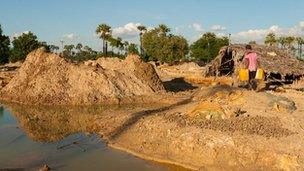
People live among waste tailings left by the mine
Unsure what to do, their commander allowed the nuns to enter. At that point it was possible to believe that Burma really had moved into a new phase. This week's violent police operation argues against such an optimistic assessment.
There are lessons too for foreign investors, in how they make deals with the government.
Wanbao argues that it did not force the villagers to give up their land, and that only a minority turned down the offer of financial compensation, and alternative housing in a new compound by the main road.
But the offer was made to the villagers not by the company but by the local authorities, accustomed to using threats and intimidation, without any outside scrutiny.
Repeated testimony by the protestors contradicts the company's account.
The fact that Wanbao is Chinese, operating in a country where resentment against the pervasive Chinese influence is growing, the fact that it is owned by a company supplying weapons to the Burmese armed forces, and the fact that it is in partnership with the biggest Burmese military holding company, make it very vulnerable to public anger.
That anger will not subside after this week's police operation. It may well escalate.